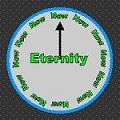

Julian Barbour and The End of Time
Here is an excerpt from the Science and Spirit interview with Julian Barbour. A link to the magazine is at the bottom.
Is time an illusion, a piece of quantum trickery that fools us into a false sensation of flow in the midst of a static reality?
Julian Barbour is an independent theoretical physicist, who lives and works just outside Oxford, England. In his ground-breaking new book, The End of Time, Barbour argues that while the laws of physics create the powerful illusion that the flow of time is real, there is increasingly strong evidence that the universe is in fact timeless. Barbour draws on quantum theory to show how the structures of the universe may in fact be static, while giving rise to the appearance of the flow of time, and he brings together quantum mechanics with the theory of relativity in a bid to solve one of the greatest paradoxes of contemporary science: the gap between classical and modern physics. . . .
Science and Spirit: We all have a strong everyday experience of time. How is that experience problematic from the perspective of theoretical physics?
Barbour: I think that our psychological experience of time--our very powerful sense that it flows, and our ability to make clocks and keep appointments and so on--may be distorting our view of the world. The human brain may be the most complicated, intricately ordered part of the universe that there is. And it's particularly slanted towards temporal aspects of things. I think we are projecting our psychological experience out into the external world when it probably isn't there. I think the evidence that there isn't a time out there in the way that we feel it inside ourselves is strong. I always quote the great sentence of Copernicus: "We should be careful not to attribute to the heavens what is really in the observer." . . .
S&S: What about the actual experience of time, as opposed to the mental models we make of the universe?
Barbour: . . . I recently heard of a Frenchman who was shut up in a cave for five days. . . . . And after five days, he was counting two and a half times too slowly. All his other bodily functions were functioning at the same rate, so the conclusion the experimenters drew from this was that our sense of the passage of time is not directly linked to our other bodily functions. . . .
S and S: Do you think the seasons, like the body, are there as natural clocks, regardless of our psychological relationship to them?
Barbour: I am a realist, and certainly the seasons are real as far as I am concerned. . . . I actually see timekeeping as no more than accurate grid locations in Platonia. When we said we would meet at six o'clock, I see that as a place in Platonia. A watch is a kind of compass to direct us to the right place.
S and S: What is Platonia?
Barbour: Platonia is the land of Nows--and a Now is a frozen moment. Imagine freezing the whole universe, taking a snapshot of it: not just you and me sitting here, but the whole of Oxford, all the way out to the most distant galaxy in one instant, that would be my idea of a Now. And then consider the collection of all possible, conceivable such Nows: every one that would be possible with the makeup of the universe. The totality of such Nows is the land I call Platonia. (More at Science and Spirit. The link is current as of this blog article date.)
